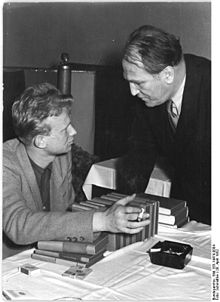Michael Tschesno-Hell

Michael Tschesno-Hell (born February 17, 1902 in Vilnius , † February 24, 1980 in East Berlin ) was a screenwriter and cultural functionary of the GDR .
Life
Hell came from an impoverished petty bourgeois family who had emigrated to Germany after the First World War . Already in his youth he joined communist associations. He later studied law at the universities in Jena and Leipzig and joined the Communist Party of Germany (KPD) as a student trainee . During the Weimar Republic , Hell worked for various communist newspapers, as a translator and as a factory and farm worker.
After the " seizure of power " by the National Socialists, he fled with his wife to France, later via the Netherlands and finally to Switzerland, where he lived until 1945. Here, together with Stephan Hermlin and Hans Mayer, he was the editor of the publication “Über die Grenzen”. At the end of the war he returned to the Soviet occupation zone and was appointed Vice President of the Central Administration for Resettlers in 1945 . In 1947 Hell was appointed director of the newly founded Volk und Welt publishing house in East Berlin, which he himself had co-founded. Since 1950 Hell, who had belonged to the Socialist Unity Party of Germany (SED) since 1946 , worked as a writer and screenwriter and also lived in the so-called "Intelligence settlement" in Berlin-Schönholz , to which Straße 201 also belongs. The basic attitude of Tschesno-Hell's works was the glorification of the Soviet Union and the Red Army as well as the heroization of the communist movement and of KPD functionaries such as Karl Liebknecht and Ernst Thälmann .
Between 1967 and 1972 Tschesno-Hell was President of the Association of Film and Television Creators in the GDR. He was a member of the board of the GDR Writers' Association. Tschesno-Hell was the recipient of numerous high state awards. These include the GDR National Prize , which he received in 1954, 1957 and 1966. In 1962 he was awarded the Order of Labor Banner , 1969 the Patriotic Order of Merit in Gold, 1972 the Star of Friendship of Nations , 1977 the Karl Marx Order and 1979 the Goethe Prize .
Michael Tschesno-Hell was married to the illustrator Ingeborg Meyer-Rey from 1951 to 1954 . With his wife of many years, Ursula Tschesno-Hell, he wrote scripts together, including The Mother and Silence .
His urn was in the grave conditioning Pergolenweg the memorial of the socialists at the Berlin Central Cemetery Friedrichsfelde buried.
His written estate is in the archive of the Academy of Arts in Berlin.
Scripts and scenarios
- 1954: Ernst Thälmann - son of his class
- 1955: Ernst Thälmann - leader in his class
- 1956: The captain of Cologne
- 1965: The mother and the silence
- 1965: As long as there is life in me
- 1969: The painter with the star
- 1972: Despite all that!
literature
- Michael Tschesno-Hell: Russia answers. A travel report. Daily review / culture and progress, Berlin 1949.
- Herbert Mayer, Bernd-Rainer Barth : Tschesno-Hell, Michael . In: Who was who in the GDR? 5th edition. Volume 2. Ch. Links, Berlin 2010, ISBN 978-3-86153-561-4 .
- Ralph Hammerthaler : The Bolshevik. Michael Tschesno-Hell and his DEFA films , DEFA Foundation series , Bertz + Fischer Verlag, Berlin 2016.
Web links
- Michael Tschesno-Hell in the Internet Movie Database (English)
- Literature by and about Michael Tschesno-Hell in the catalog of the German National Library
Individual evidence
- ↑ http://www.max-lingner-stiftung.de/intellektivensiedlung
- ↑ Cristina Fischer: A man with many faces. June 3, 2016, accessed May 12, 2020 .
- ^ Ines Walk: Biography of Michael Tschesno-Hell. August 2006, accessed May 12, 2020 .
- ↑ Michael Teschesno-Hell archive stock overview on the websites of the Academy of Arts in Berlin.
- ↑ The Bolshevik. Michael Tschesno-Hell and his DEFA films. DEFA Foundation, accessed on February 3, 2020 .
| personal data | |
|---|---|
| SURNAME | Tschesno-Hell, Michael |
| BRIEF DESCRIPTION | German screenwriter and cultural functionary |
| DATE OF BIRTH | February 17, 1902 |
| PLACE OF BIRTH | Vilnius , Lithuania |
| DATE OF DEATH | February 24, 1980 |
| Place of death | East Berlin |
